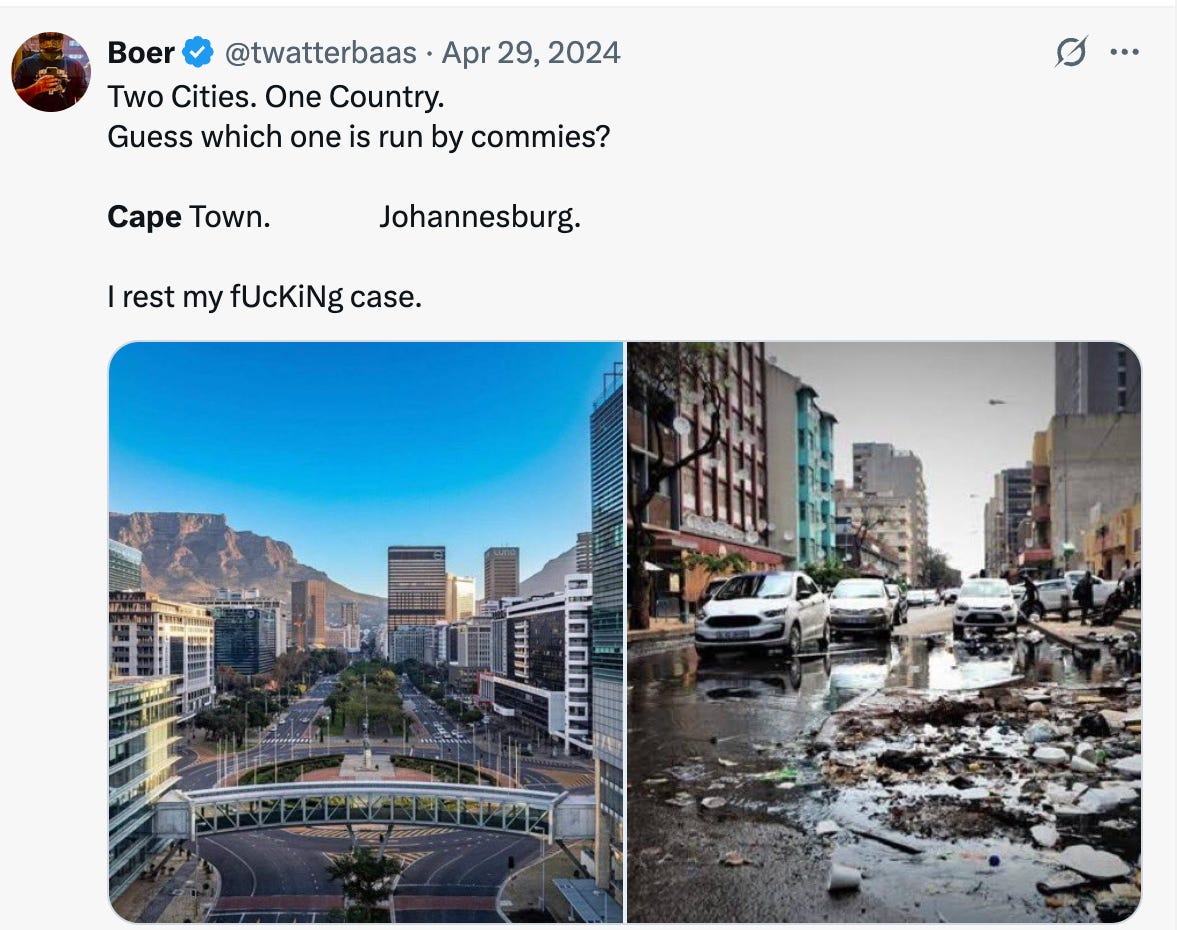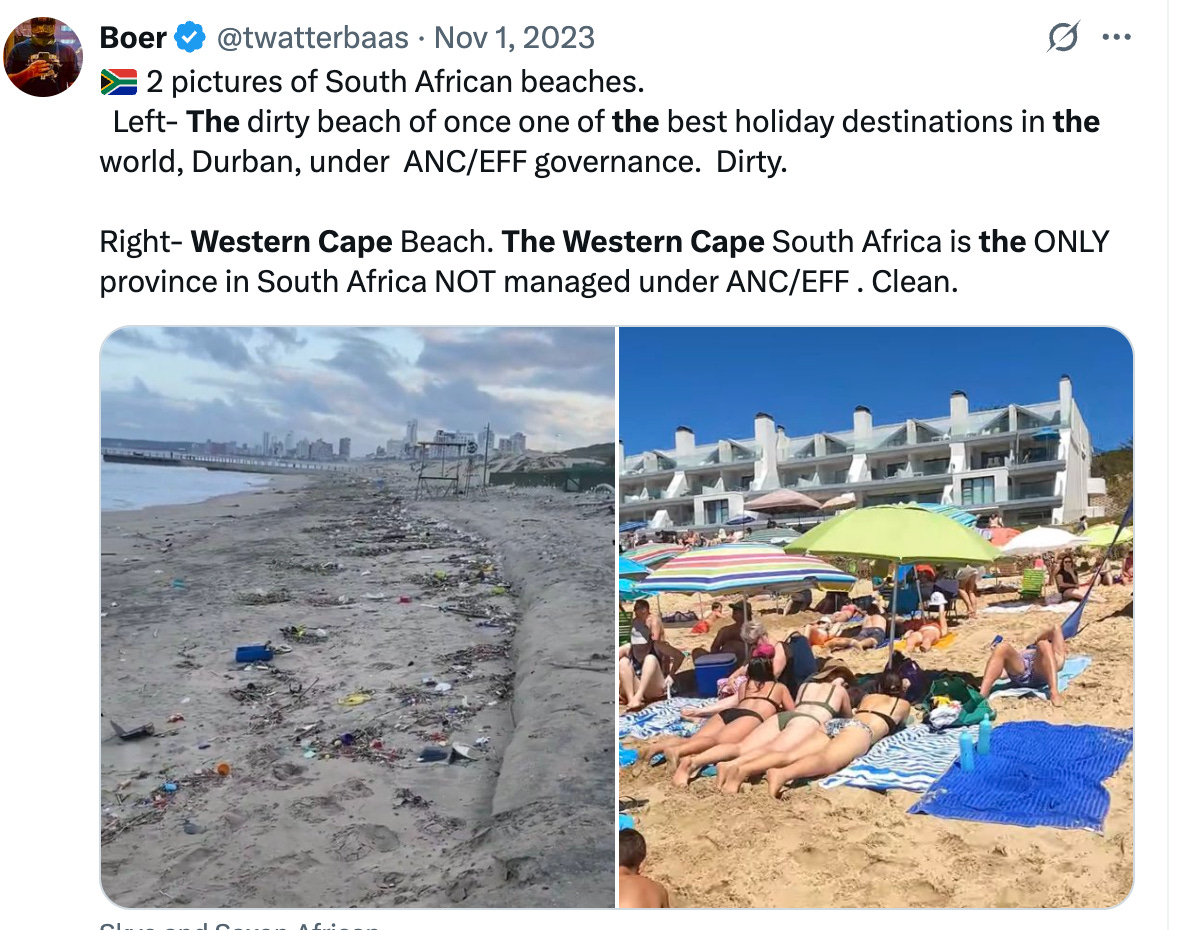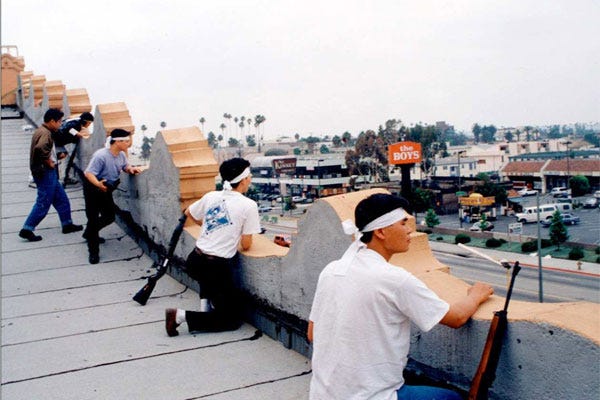Lessons from South Africa for Americans Preparing for South Africanization
A State of Low-Grade War
Welcome back, and thanks for reading. Today’s article is about a subject much less theoretical than normal, but one I think that people might find helpful given both the horrific slaying of Iryna Zarutska in Charlotte and the assassination of Charlie Kirk in Utah: how does one stay safe in a violent world gone mad, a land where targeted hits and rampant anarchy are the normal state of things? As the situation in South Africa is not unlike ours in many ways, I think covering it here will be relevant, and hopefully helpful for y’all. As always, please tap the heart icon to “like” this article, as that is how the algorithm knows how to promote it!
South Africa is a land of horrible anarchy and rampant crime, a place where targeted hits on whites in the name of “justice” occur regularly1 and stomach-churningly violent crime is so rampant as to be unexceptional. That is to say, it sounds a lot like America’s anarchic2 and decaying cities3…just a few years ahead of the curve.
So, how do South Africans defend themselves while living in a country more violent and crime-ridden than Somalia?4 Prudence, embracing the logical conclusions of present trends, and applying the classic principles of defense to modern forms. Given the continual drift of America toward South Africanization, it’s an approach I think Americans who are worried about the present state of their world could and should learn a great deal from, as I’ll discuss below.
Listen to the audio version of this article here:
The Principles of Personal Survival in a South Africanizing World
Getting the Basic Mindset Right
The first thing to get right, I think, is remembering that firearms are just tools, not an end-all, be-all solution to the problem. This is something many Americans raised in the “just shoot them” tradition don’t understand. Yes, if you live in a small town with a conservative sheriff and some junky tries robbing you in your house, the trusty old Mossberg 590 or more modern AR-15 is a great way to deal with that problem.
But that is a specific scenario in which all the stars have aligned on “this will probably end all right, so long as my aim is true.”
What happens when the stars don’t align, and pulling the trigger could end your life? What about, for example, when you’re driving to work and a carjacking happens on an urban street?
The leftist DA will claim you shot the murderous felon who was released fourteen times for “racist” reasons. The urban jury pool can’t be trusted to make law and fact-based decisions, and has been shown to be biased against whites.5 The judges in these places are often equally bad.6 In Texas, Army Sergeant Daniel Perry was delivering food for Uber in Austin when an Antifa goon attacked him with an AK-47; Perry defended himself with deadly force, and was convicted by an Austin jury. Had Gov. Abbott not pardoned him, he would have spent 25 years in prison.7
Similarly, what if you own one of the homes in Detroit that was targeted by signal-jammer-wielding,8 cartel-connected gangs?9 Perhaps you can fight off a dozen armed attackers who have blocked you from calling for help…but then again, even those prepared for such things in Rhodesia, armed with everything from rooftop machine gun nests to improvised landmines, had trouble doing so.10
What if you had to fight off a leftist terror group like those described in Days of Rage, an almost suicidally violent gaggle of committed ideologues who want nothing more than to kill you, and who are supported by the vast NGO complex and most levels of the liberal government? Would having a Glock 19 in your standard suburban home be an ideal situation, were that horrific eventuality to occur? Maybe. But probably not.
That’s not to say that firearms aren’t an excellent tool for these situations. They are, and anyone who is serious about surviving what is coming (or in many cases, already here) should have those tools. But simply buying a gun, shooting it a couple times, and putting it in the safe isn’t a universal salve that will be sufficient for sorting out America’s problems. A more holistic mindset and intentional approach is needed, which is what South Africa’s experience with staying safe in an anarchic world gone mad teaches.
Step One: Avoiding It All As Much as You Are Able
There are few good reasons to live in most American cities at this point. A few are nice, or at least have nice parts that keep away the violent riffraff, whether it be of the Antifa sort or Decarlos Dejuan Brown Jr. sort.11 But, on the whole, life in most American urban zones means putting up not just with the financial costs long attendant to city life, but a much greater risk of violent crime.
The same is true of most blue states. Parts of some are nice enough, and some in the Northeast (Vermont and New Hampshire, in particular) are generally free of most current crime problems. But, on the whole, the environment is a dangerous one: the classic anarchotyranny mixture of intense, punitive regulation of law-abiding citizens paired with total freedom of action for criminal elements makes life unbearable. Hence why doing real-world economic activity like pumping oil or building homes is nearly impossible in California, due to regulation, yet there are entire swathes of cities overrun with homeless squatters, and having one’s car broken into is a regular occurrence. The point of the bureaucracy12 is to extract from normal, productive people, not to keep them safe from anarchy. The best example of this is squatting: in most blue states and cities, the law exists to protect squatters from eviction rather than landlords from squatters.
The same is largely true (though without the red-blue filter) in much of South Africa. Old cities known as gems a few decades ago—Durban, Johannesburg, and Pretoria—are so dangerous and ill-run as to be basically unlivable. Decades of mismanagement and rampant corruption mean that water and electricity are unreliable, the roads are pothole-ridden, and basic public services like the garbage service13 or police forces are either unreliable or nonexistent. Crime is higher than nearly anywhere else in the world, destructive riots are common, and entire skyscrapers have been overtaken by squatters.
Meanwhile, moving to a farm and rural life in the vicinity of such cities is often no escape: farm attacks are even more brutal than city crimes, gangs of squatters are allowed to take over and destroy white-owned farms, and armed mining gangs called zama zamas reign with brutal authority over isolated, mineral-rich areas.14
The response of the white South Africans has largely been to move to a safe area, whether that be to a protected section of the city,15 to the Western Cape, or to a secure town like Orania, where it is most possible to escape the South Africanization.
Generally, territorial migration to the Western Cape is seen as preferable to just moving to a better-defended neighborhood, as it is a province not yet destroyed by the ruling ANC regime or its cronies.16
That’s not to say it is perfect. But generally, the administration is better, the municipal services work better, crime is lower, and—critically—it is much less likely that the ruling clique will be immediately hostile to you if you have to defend yourself. In other words, though one must still take efforts to stay safe, the region functions better than anywhere else, and so is desirable for that reason.
So, once in a safer and better-run area, focusing on security is still a must. But, rather than investing immense sums in a house that will always be more and more unsafe due to the local government’s pro-crime stance, it’s best to move first and then build a defensible life.
Private Security
The next step, before getting into the details of home defense, is private security. There’s a reason that South Africa’s private security sector is the biggest in the world, bigger than the entirety of the South African military and police force combined17: it works reasonably well, and is far better than the alternative of hoping the police show up despite all the evidence that they certainly won’t.
The problem with relying on building a defensible house, as the Rhodesians learned in their Bush War18, is that if there is no relief force on the way, then the attackers will almost certainly eventually succeed. Whatever weakness there is in the armor will be found and exploited, much to the denizens’ detriment. Further, and even more importantly in terms of the crime problem, defensive structures can’t patrol. They can’t be on the lookout for strange cars that shouldn’t be there, loitering vagrants eyeing things a little too keenly, cut fencing, or any of the other telltale signs that crime is likely coming. Nor, generally, can the residents: they have to work, and focus on the other exigencies of daily life rather than be on the defensive against criminal networks.
In a civilized society, it’s the police that are meant to fill that gap and stay on the lookout for the telltale signs of potential crime and criminals. But when the police are some mixture of incompetent and on the side of the criminals, they can’t be relied upon.
That’s the gap private security fills. Like Blackwater during Katrina,19 reliable private security forces can be trusted to actually protect their clients, and can remain focused on dealing exclusively with the crime problem—whether patrolling on the search for potential crime or responding directly to reported incidents—unlike the police or neighbors.
That lesson has sunk home in South Africa, and now virtually everyone who can remotely afford to hire private security—whether individually or in the group setting of a neighborhood—does so: there are now over 2.7 million private security personnel in the country of about 62 million people, compared with under 200,000 police officers.20
There are limitations. The private security forces have to hand over suspects to the police, not deal with them privately. Dwellings still have to be fortified, so you can wait out the attack/break-in until the security force arrives. It’s expensive, and you still have to pay taxes that theoretically support the (corrupt and ineffective) police force. It also works better in fortified suburban settings than widely dispersed rural ones, which make both patrolling and responding harder, or dense urban settings in which the throng of compressed humanity makes patrolling for potential problems ahead of time more difficult.
But, still, it’s reasonably effective and worth paying for, as shown by the skyrocketing number of firms (and personnel working for them) employed by South Africans who want to stay safe.21
Fortified Dwellings
Generally, however, the private security forces are a useful resource rather than a universal solution. Hired men kitted out in body armor with rifles and radios is better than not, of course, but they can’t be everywhere at once or catch every potential criminal. This is particularly true when endemic lawlessness has turned entire cities into festering hives of criminality, and only a few secure neighborhoods are left. So, the South Africans have taken to fortifying their homes like latter-day castles.
This process starts at the outer perimeter: whereas the Rhodesians simply needed chain-link fencing, the ideal in modern South Africa is a thick brick or concrete wall.22 Ten or twelve feet high and often a foot or so thick, these stand as a sturdy barrier between the home’s denizens and the potential horde outside. But a wall is nothing if it can be easily gotten over, so the walls are generally topped with thick metal spikes, razor wire, electrified wire, or some combination thereof. Similarly, the entryway is a thick metal gate that can’t be rammed down with a car, and it too is topped with spikes and often electric wire.
The process continues inside the perimeter: while criminals who rely on chance will typically avoid a fortified house at the sight of the wall and electrified razor wire, those who are targeting the house specifically—perhaps because a cleaner informed them of the valuables within—can generally get over a wall. To identify them as they do so, South Africans rely on security features as old as time—guard dogs—and more modern solutions, such as motion-sensing alarms, automatic lights with immense candlepower, and security cameras. Some houses even have cameras equipped with remotely fired crowd control guns, as demonstrated in the video below.
Then, if the criminals make it over the wall and its electric fence, aren’t deterred by the bright lights or crowd control guns, they are at the house and need to get in. South Africans have taken to medieval tactics to defend their homes from breach attempts: the external doors (and some internal doors) are reinforced with metal that makes them hard to batter down, windows are covered in metal bars that make squeezing in through the window difficult, and alarms connect automatically to the private security companies employed.
Then, if the criminals manage to get inside the house before the private security personnel arrive, the South Africans use metal-reinforced internal safe rooms to stay protected. Often, radios, landlines, and cellphones are all present and used in the hope that at least one can be used to communicate with private security or neighbors to call for help.
Finally, as gun laws are relatively permissive in South Africa and the use of deadly force is allowed when you are being attacked, they make use of the full suite of semi-automatic or mechanical action weapons. Not just hunting rifles and shotguns, but battle rifles like the R1 (a locally produced FN FAL), handguns, and the like are owned and regularly used by South African homeowners.
That is, however, generally the last line of defense: using deadly force is almost always a legal headache that could end in horrifying incarceration, so it’s best to rely on the mercenaries and passive defense features, rather than potentially life-destroying uses of deadly force.
Community Mindedness
Finally, sometimes it all isn’t enough. The private security forces and police are overstretched, the neighborhood fortifications not sturdy enough, and the police entirely absent as a rampaging mob of criminals, generally rioters, heads the way of the few productive people left—those present find themselves in a position not unlike the McCloskeys, a Rorke’s Drift in the modern day.
This is where the last key ingredient really comes in: community mobilization.
Whether volunteer community safety responders who take time out of their week to go on security patrols at night, like my friend K9 Reaper,23 or thin lines of men that stand up and start shooting to protect their homes from rioters, South Africans have managed to mobilize themselves in groups that can respond to the crime problem and fill in the gaps when private security is missing. During the 2021 riots, for example, it was a thin line of private citizens who banded together and used their own firearms to stop a horde of rioters, as shown here:
In the end, it’s only those who are 1) prepared, and 2) fight back when they have to, who survive. Those who leave it all to chance or prepare but place all their faith in gadgets are, much like during the Bush War, those who die.24
From an American Perspective
With the exception of militia-like activity, such as private (armed) crime patrols, much of this is relevant to Americans, even the more radical parts, like community mobilization. The businesses in blue areas that weren’t destroyed during the BLM riots of 2020, for instance, were often the ones with armed guards—most of them store owners and friends—out front. The same is of course true of the famous “Roof Koreans” of 1992 LA riots fame.25
But events where that is relevant are rare; the best way to survive a riot is to just not be near it.26 It should be planned for, and you should know your neighbors, but there are other lessons likely to matter more to you, if you just get away from the places where riots occur.
Generally, then, there are a few principles from South Africa that Americans should keep in mind as they decide where and how to live, along with what investments in defense they should make:
Owning firearms and knowing how to use them is necessary but not sufficient. Yes, when the thugs come smashing through the door, having a rifle or shotgun in hand that you know how to use and that has enough ammunition at the ready to deal with multiple intruders is probably the only way you will survive. But, at that point, much should have held them up, and there should have been measures in place that delayed but did not stop them. Firearms are an integral part of the holistic defense preparation process, not an end-all be-all, particularly as the use of deadly force can land you in trouble with the law, even if you were theoretically well within your rights.
The best preparation you can make is finding a friendly and stable jurisdiction. Back in the day when things were civilized, you could find the best job or life situation possible and move there (or stay there). Not so much anymore. While that is true to an extent, there are some good jobs (e.g., at the Big Tech companies or Big Banks in NYC) in areas that are effectively no-go zones for normal people. Yes, you’ll generally be safe enough. But on the day you aren’t, you’ll end up like Daniel Penny—charged for defending himself and his fellow passengers—or Iryna Zarutska—stabbed to death because no one stood up. The best thing you can possibly do is move to an area where 1) violent crime likely won’t be a problem, and 2) local law enforcement and government are on the side of law-abiding citizens rather than criminals. That way, it’s unlikely most of this will come up, and if you ever do have to use your firearm, you won’t face prosecution for defending yourself. Thanks to online jobs, this is achievable for those who want it to be.27
Individualism is self-suicide when push comes to shove, even if you plan ahead. Yes, you should put your family’s security first and make decisions based on that. But how do you plan on keeping the town government on your side? Who will rescue you if your security precautions fail? This is where community involvement and participation come in. You need to stay involved in local politics to keep the government on your side, get involved with community members so there is a core group that can take action if disaster strikes, and generally stay abreast of what is going on in your area rather than living in isolated ignorance of it. Further, this means not being too proud to provide or ask for help. Many say they’d rather protect themselves than pay private security to help protect them…which sounds great until 5 men are trying to batter down your door at 4 am, and no one can be called to help.
Only the prepared survive, and their many preparations will someday matter. Though we can’t know what the future will bring, what we can do is prepare as best we’re able. In South Africa, that means walls and razor wire, safe rooms and electric fences. Here, it might mean defensive features that are less radical—such as sturdy shutters rather than iron bars and a steel, decorative spike-topped fence rather than a concrete wall with razor wire—with the option to add on even more extensive security features later. Maybe it means having a private security force on call that deals generally with minor disturbances rather than outright war with the criminal elements. Or maybe it means just getting good security on your payroll now, rather than when it’s more in demand later. Regardless, what we have seen time and time again is that only the prepared survive. In the Rhodesian Bush War, it was the farmers who thought nothing could ever happen to them—and thus that they didn’t need to make the expensive security upgrades—who were more likely to be attacked, and much more likely to die.28 In South Africa, the undefended homes are far more at risk of the rampant criminality than the ones that are seriously guarded at every step. You needn’t be paranoid, but you should prepare as best you’re able. It’ll likely be what saves you.
All in all, what must be kept in mind is that the South Africanization of America is still happening in many parts of the country. We have a significant anarchotyranny problem,29 even with Trump in charge, and the problems baked into the cake (DEI, disparate impact judges, etc), mean that is going nowhere. In fact, with civil conflict of the ‘70s mold or worse not just on the horizon but staring us in the face,30 things could soon go from bad to very bad in terms of public violence.
That means that the lessons of others who have trodden down this same dark path can’t be ignored. South Africa is a crystal ball for America: even if we don’t follow exactly in their footsteps, the egalitarian curse that afflicts both our nations means that our problems are similar and likely to follow a similar trajectory. They have learned how to defend their lives and homes in a very hostile world, and we really ought to learn from their terrible experience. It might just save our lives.
Thanks again for reading! If you found value in this article, please consider liking it using the button below, and upgrading to become a paid subscriber. That subscriber revenue supports the project and aids my attempts to share these important stories, and what they mean for you. Also, it gets you full access to paywalled articles, like the recent article on lessons for Americans from the Rhodesian Bush War.
As K9 Reaper noted in our interview, nearly all of the farm murders target whites:
Yes, really: https://africa.ocindex.net/rankings
Yes, really:
On the signal jammer problem:
More details on the signal jammer gangs: https://www.clickondetroit.com/news/local/2023/12/07/videos-organized-crews-smash-glass-use-jammers-to-break-into-high-end-metro-detroit-homes/
The Charlotte murderer: https://www.justice.gov/opa/pr/justice-department-charges-light-rail-attacker-federal-crime
Described here:
To some extent, that is described in this article on the lawlessness in Johannesburg: https://medium.com/globetrotters/the-lawlessness-in-johannesburg-was-far-worse-than-we-anticipated-1e3411dbde0c
Noted by a major South African account here: https://x.com/twatterbaas/status/1740379049636090335
He talks about his life here:
This is a point that Don Shift made in this podcast:
This is a point my friend Arbitrage Andy has noted repeatedly, like in our podcast together:









In light of the recent unpleasantness, residents of metropolitan Detroit and Chicago would be well advised to consider relocating to Michigan's Upper Peninsula. It has a low crime rate, low housing prices, and a positive demographic outlook. The culture resembles that of the American Northeast from approximately a half-century ago. In my opinion, Northerners would feel more at home here than in such other popular destinations as Florida, Texas or Idaho. If there was a true breakdown of society, note that the Upper Peninsula is separated from lower Michigan by the Mackinac Bridge, and from the urban belt of Chicagoland by an impenetrable morass of forest and cranberry bogs two hundred miles wide. If you are curious, first visit on vacation. You might be pleasantly surprised ...
Did you see the article in The Telegraph (London) on 15 September extolling the virtues of UK retirees moving to Cape Town?
https://www.telegraph.co.uk/money/retirement/cape-town-attracting-retirees-returning-south-africans/